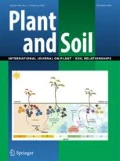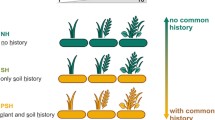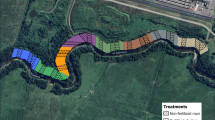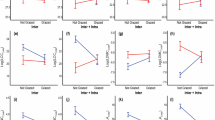Abstract
Trembling aspen (Populus tremuloides Michx.) is the most widely distributed tree species in North America making it important to terrestrial carbon and nutrient cycles. Due to anthropogenic climate change high latitude temperatures are expected to increase, making it necessary to assess the feedback between above- and below-ground carbon pools to increased temperature at sites of both high and low N-availability. We grew four clones of aspen at two levels of soil temperature and two levels of soil N-availability for 98 days and quantified photosynthesis, growth, biomass allocation, and root length production and mortality. High soil temperature increased rates of photosynthesis (65%), resulting in greater whole-plant growth (37%) through increases in roots, stems, and foliage; however these increases generally occurred only in soil of high N-availability. Root:shoot biomass allocation varied between clones but was unaffected by the soil temperature or N-availability treatments. Root length production and mortality increased at elevated soil temperature, but this response was modified by soil N-availability. At high soil temperature, soil N-availability had little effect on root dynamics, while at low soil temperature, high soil N-availability increased both the production and mortality (turnover) of roots. We conclude that trembling aspen has the potential for substantially greater growth and root turnover under conditions of warmer soil at sites of both high and low N-availability, but that allometric patterns of growth are under strong genetic, rather than environmental control.
Similar content being viewed by others
References
Alban D H and Perala D A 1992 Carbon storage in Lake States aspen ecosystems. Can. J. For. Res. 22, 1107–1110.
Amthor J S 1995 Terrestrial higher-plant response to increasing atmospheric [CO2] in relation to the global carbon cycle. Global Change Biol. 1, 254–274.
Barnes B V 1959 Natural variation and clonal development of Populus tremuloides and P. grandidentata in Northern Lower Michigan. Ph.D. Thesis, The University ofMichigan, Ann Arbor. 344 p.
Barnes B V and Wagner Jr W H 1981 Michigan trees. The University of Michigan Press, Ann Arbor. 383 p.
Berntson G M and Bazzaz F A 1996 The allometry of root production and loss inseedlings of Acer rubrum (Aceraceae) and Betula papyrifera (Betulaceae): Implications for root dynamics in elevated CO2. Am. J. Bot. 83, 608–616.
Billings WD, Peterson K M, Shaver G R and Trent A W 1977 Root growth, respiration, and carbon dioxide evolution in an arctic tundra soil. Art. Alp. Res. 9, 129–137.
Billings W D, Luken J O, Mortensen D A and Peterson K M 1982 Arctic tundra: a source or sink for atmospheric carbon dioxide in a changing environment? Oecologia 53, 7–11.
Boone, R D, Nadelhoffer K J, Canary J D and Kaye J P 1998. Roots exert a strong influence on the temperature sensitivity of soil respiration. Nature 396: 570–572.
Burton A J, Pregitzer K S, Zogg G P and Zak D R 1996 Latitudinal variation in sugar maple fine root respiration. Can. J. For. Res. 26, 1761–1768.
Day T A, Heckathorn S A and Delucia E H 1991 Limitations of photosynthesis in Pinus taeda L. (loblolly pine) at low soil temperatures. Plant Physiol. 96, 1246–1254.
Delucia E H 1986 Effect of low root temperature on net photosynthesis, stomatal conductance and carbohydrate concentration in Engelman spruce (Picea engelmannii Parry ex Engelm.) seedlings. Tree Physiol. 2, 143–154.
Delucia E H and Smith W K 1987 Air and soil temperature limitation on photosynthesis in Engelman spruce during summer. Can. J. For. Res. 17, 527–533.
Eissenstat D M 1992 Costs and benefits of constructing roots of small diameter. J. Plant Nutr. 15, 763–782.
Fitter A H, Graves J D, Wolfenden J, Self G K, Brown T K, Bogie D and Mansfield T A 1997 Root production and turnover and carbon budgets of two contrasting grasslands under ambient and elevated atmospheric carbon dioxide concentrations. New Phytol. 137, 247–255.
Fitter A H, Graves J D, Self G K, Brown T K, Bogie D S and Taylor K 1998 Root production, turnover and respiration under two grassland types along an altitudinal gradient: influence of temperature and solar radiation. Oecologia 114, 20–30.
Fogel R 1983 Root turnover and productivity of coniferous forests. Plant Soil 71, 75–85.
Galloway J N, Schlesinger WH, Levy II H, Michaels A and Schnoor J L 1995 Nitrogen fixation: Anthropogenic enhancementenvironmental response. Global Biogeochem. Cycles 9, 235–252.
Ganopolski A, Kubatzki C, Claussen M, Brovkin V and Petoukhov V 1998 The influence of vegetation-atmosphere-ocean interaction on climate during the Mid-Holocene. Science 280, 1916–1919.
Gebauer R L E, Reynolds J F and Strain B R 1996 Allometric relations and growth in Pinus taeda: the effect of elevated CO2 and changing N availability. New Phytol. 134, 85–93.
Gedroc J J, McConnaghay K D M and Coleman J S 1996 Plasticity in root/shoot partitioning: optimal, ontogenetic, or both? Func. Ecol. 10, 44–50.
Griffin K L, Winner WE and Strain B R 1995 Growth and drymatter partitioning in loblolly and ponderosa pine seedlings in response to carbon and nitrogen availability. New Phytol. 129, 547–556.
Grossnickle S C and Blake T J 1985 Acclimation of cold-stored jack pine and white spruce seedlings: effect of soil temperature on water relation patterns. Can. J. For. Res. 15, 544–550.
Hendrick R L and Pregitzer K S 1993 Patterns of fine root mortality in two sugar maple forests. Nature 361, 59–61.
Hendrick R L and Pregitzer K S 1997 The relationship between fine root demography and the soil environment in northern hardwood forests. Ecoscience 4, 99–105.
Hobbie S A 1996 Temperature and plant species control over litter decomposition in Alaskan tundra. Ecol. Mono. 66, 503–522.
Hooker, J E, Black K E, Perry R L and Atkinson D 1995 Arbuscular mycorrhizal fungi induced alteration to root longevity in poplar. Plant Soil 172, 327–329.
Houghton J T, Meira Filho L G, Callander B A, Harris N, Kattenberg A and Maskell K 1996 Technical summary. In Climate change 1995: The science of climate change. Contribution of Working Group 1 to the Second Assessment Report of the Intergovernmental Panel on Climate Change. Eds J T Houghton, L G Meira Filho, B A Callander, N Harris, A Kattenberg and K Maskell. pp 13–49. Cambridge University Press, Cambridge.
Jurik T W, Briggs G M and Gates D M 1988 Springtime recovery of photosynthetic activity of white pine in Michigan. Can. J. Bot. 66, 138–141.
Kaspar T C and Bland W L 1992 Soil temperature and root growth. Soil Sci. 154, 290–299.
King J S, Albaugh T J, Allen H L and Kress L W 1999 Standlevel allometry in Pinus taeda as affected by irrigation and fertilization. Tree Physiol. (In review).
Kubiske M, Pregitzer K S, Zak D R and Mikan C J 1998 Growth and carbon allocation of Populus tremuloides clones in response to atmospheric CO2 and soil nitrogen availability. New Phytol. 140, 251–260.
Landhäusser S M, Wein R W and Lange P 1996 Gas exchange and growth of three arctic tree-line tree species under different soil temperature and drought preconditioning regimes. Can. J. Bot. 74, 686–693.
Lawrence W T and Oechel W C 1983 Effect of soil temperature on the carbon exchange of seedlings. I. Root respiration. Can. J. For. Res. 3, 840–849.
Lawrence W T and Oechel W C 1984 Soil temperature effects on carbon exchange in taiga trees. Tasks Veg. Sci. 13, 127–136.
Ledig F T, Bormann F H and Wenger K F 1970 The distribution of dry matter growth between shoot and roots in loblolly pine. Bot. Gaz. 131, 349–359.
Lieth H 1975 Modeling the primary productivity of the world. In Primary Productivity of the Biosphere. Eds H Lieth and R H Whittaker. pp 237–263. Springer-Verlag, New York.
Linder S and Troeng E 1981 The seasonal variation in stem and coarse root respiration of a 20-year old Scots pine (Pinus sylvestris L.). Mitt. Fors. Bund. Wien 142, 125–139.
Lippu J and Puttonen P 1991 Soil temperature limitations on gas exchange in 1-year-old Pinus sylvestris (L.) seedlings. Scand. J. For. Res. 6, 73–78.
Lopushinsky W and Kaufman M R 1984 Effects of cold soil on water relations and spring growth of Douglas-fir seedlings. For. Sci. 30, 628–634.
Lyr H and Hoffman G 1967 Growth rates and growth periodicity of tree roots. Int. Rev. For. Res. 2, 181–236.
Marshall J D and Waring R H 1985 Predicting fine root production and turnover bymonitoring root starch and soil temperature. Can. J. For. Res. 15, 791–800.
Melillo J M, Prentice I C, Farquhar G D, Schulze E.-D and Sala O E 1996 Terrestrial biotic responses to environmental change and feedbacks to climate. In Climate change 1995: The science of climate change. Contribution of Working Group 1 to the Second Assessment Report of the Intergovernmental Panel on Climate-Change. Eds J T Houghton, L G Meira Filho, B A Callander, N Harris, A Kattenberg and K Maskell. pp 449–481. Cambridge University Press, Cambridge
Meredith M P and Stehman, S V 1991 Repeated measures experiments in forestry: focus on analysis of response curves. Can. J. For. Res. 21, 957–965.
Niklas K J 1994 Plant allometry: The scaling of forms and process. University of Chicago Press, Chicago, IL. 395 p.
Norby R J, Wullschleger S D and Gunderson C A 1996 Tree responses to elevated CO2 and implications for forests. In Carbon dioxide and terrestrial ecosystems. Eds G W Koch and H A Mooney. pp 1–21. Academic Press, Inc., San Diego.
Oechel W C and Vourlitis G L 1996 Direct effects of elevated CO2 on arctic plant and ecosystem function. In Carbon dioxide and terrestrial ecosystems. Eds GW Koch and H A Mooney. pp 163–176. Academic Press, Inc., San Diego.
Olson J S 1963 Energy storage and the balance of producers and decomposers in ecological systems. Ecology 44, 322–331.
Parsons A N, Welker J M, Wookey P A, Press M C, Callaghan T V and Lee J A 1994 Growth responses of four sub-Arctic dwarf shrubs to simulated environmental change. J. Ecol. 82, 307–318.
Perala D A 1990 Populus tremuloides Michx., trembling aspen. In Silvics of North America, Volume 2, Hardwoods. Eds R M B Burns and B H Honkala. pp 555–569. USDA Forest Service Handbook Number 654, Washington DC.
Peterjohn W T, Mellilo J M, Steudler P A, Newkirk K M, Bowles F P and Aber J D 1994 Responses of trace gas fluxes and N availability to experimentally elevated soil temperature. Ecol. App. 4, 617–625.
Pregitzer K S, Hendrick R L and Fogel 1993 The demography of fine roots in response to patches of water and nitrogen. New Phytol. 125, 575–580.
Pregitzer K S, Zak D R, Curtis P S, Kubiske M E, Teeri J A and Vogel C S 1995 Atmospheric CO2, soil nitrogen and turnover of fine roots. New Phytol. 129, 579–585.
Randlett D L, Zak D R, Pregitzer K S and Curtis P S 1996 Elevated atmospheric carbon dioxide and leaf litter chemistry: Influences on microbial respiration and net nitrogen mineralization. Soil Sci. Soc. Am. J. 60, 1571–1577.
Redmond D R 1955 Studies in forest pathology. XV. Rootlets, mycorrhiza, and soil temperatures in relation to birch dieback. Can. J. Bot. 33, 595–627.
Robson D S 1959 A simple method for constructing orthogonal polynomials when the independent variable is unequally spaced. Biometrics 15, 187–191.
Sands R 1984 Transplanting stress in Radiata pine. Aust. For. Res. 14, 67–72.
Schwarz P A, Fahey T J and Dawson T E 1997 Seasonal air and soil temperature effects on photosynthesis in red spruce (Picea rubens) saplings. Tree Physiol. 17, 187–194.
Sokal R R and Rohlf F J 1995 Biometry. 3rd edition. W.H. Freeman and Company, NewYork. 887 p.
Steel R G D and Torrie J H 1980 Principles and procedures of statistics. 2nd edition. McGraw-Hill, New York. 633 p.
Tabbush P M 1986 Rough handling, soil temperature, and root development in outplanted Sitka spruce and Douglas fir. Can. J. For. Res. 16, 1385–1388.
Tissue D T, Thomas R B and Strain B R 1996 Growth and photosynthesis of loblolly pine (Pinus taeda) after exposure to elevated CO2 for 19 months in the field. Tree Physiol. 16, 49–59.
Troughton A 1955 The application of the allometric formula to the study of the relationship between roots and shoots of young grass plants. Ag. Prog. 30, 59–65.
Tryon P R and Chapin III F S 1983 Temperature control over root growth and root biomass in taiga forest trees. Can. J. For. Res. 13, 827–833.
Vitousek P M, Aber J D, Howarth R W, Likens G E, Matson P A, Schindler D W, Schlesinger W H and Tilman D G 1997 Human alterations of the global nitrogen cycle: sources and consequences. Ecol. Appl. 7, 737–750.
Waring R H and Schlesinger W H 1985 Forest ecosystems: Concepts and management. Academic Press, San Diego. 340 p.
Zak D R and Pregitzer K S 1990 Spatial and temporal variability of nitrogen cycling innorthern Lower Michigan. For. Sci. 36, 367–380.
Zak D R, Pregitzer K S, Curtis P S, Teeri J A, Fogel R and Randlett D L 1993 Elevated atmospheric CO2 and feedback between carbon and nitrogen cycles. Plant Soil 151, 105–117.
Author information
Authors and Affiliations
Rights and permissions
About this article
Cite this article
King, J.S., Pregitzer, K.S. & Zak, D.R. Clonal variation in above- and below-ground growth responses of Populus tremuloides Michaux: Influence of soil warming and nutrient availability. Plant and Soil 217, 119–130 (1999). https://doi.org/10.1023/A:1004560311563
Issue Date:
DOI: https://doi.org/10.1023/A:1004560311563




